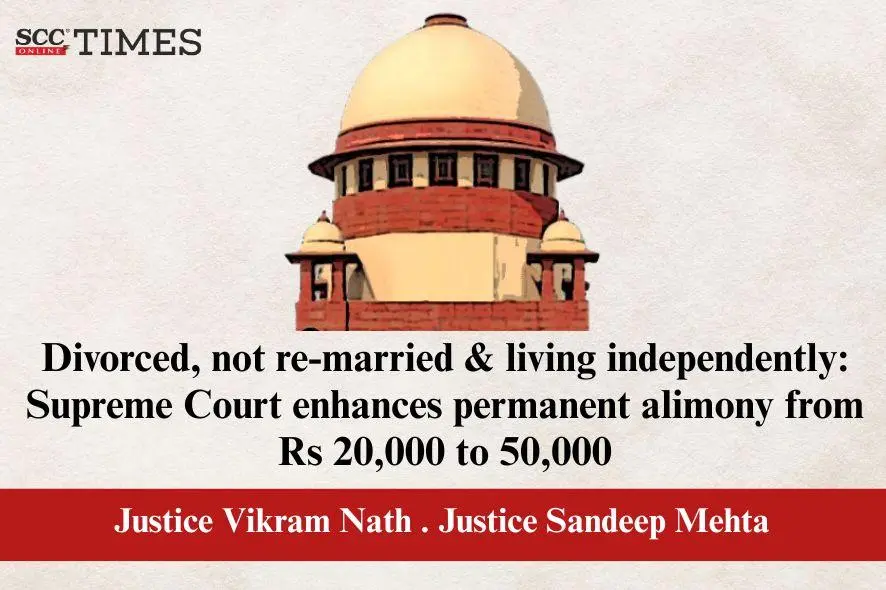Supreme Court: While considering an appeal wherein a woman challenged the quantum of permanent alimony of Rs. 20,000 fixed by Calcutta High Court; the Division Bench of Vikram Nath* and Sandeep Mehta, JJ., modified the impugned judgment and determined that a permanent alimony of Rs. 50,000 per month would be just, fair and reasonable to ensure financial stability for the woman. The Court opined that the woman, who remained unmarried and is living independently, was entitled to a level of maintenance that is reflective of the standard of living she enjoyed during the marriage, and which reasonably secures her future. Furthermore, the inflationary cost of living and her continued reliance on maintenance as the sole means of financial support necessitated a reassessment.
Background and Legal Trajectory:
The woman got married in 1997 and in 1998 a son was born to her. In July 2008, her estranged husband filed Matrimonial Suit under Section 27 of the Special Marriage Act, 1954 seeking dissolution of marriage on the ground of cruelty allegedly inflicted by her. Subsequently, the woman filed an application in the same suit under Section 24 of the Hindu Marriage Act, 1955, seeking interim maintenance for herself and minor son.
In 2016, the Trial Court dismissed the matrimonial suit, finding that the husband had failed to prove cruelty. Aggrieved, the husband approached Calcutta High Court. During pendency of husband’s appeal before the High Court, the woman filed an application seeking interim maintenance of Rs. 30,000 for herself and Rs. 20,000 for the son, along with Rs. 50,000 towards litigation expenses. The High Court noted that the husband was drawing a net monthly salary of Rs. 69,000/- and enhanced the interim maintenance to Rs. 20,000/- per month.
The High Court, by the impugned order in 2019 allowed the husband’s appeal, granted a decree of divorce on the ground of mental cruelty and irretrievable breakdown of marriage, and directed the husband to redeem the mortgage on the flat where the woman was residing and transfer the title deed to her name by 31-08-2019; allow herand their son to continue residing in the said flat; continue to pay permanent alimony of Rs. 20,000 per month, subject to a 5% increase every three years. Additionally, the High Court directed payment of educational expenses for the son’s university education and Rs. 5,000/- per month for private tuition.
Aggrieved by the quantum of alimony awarded, the woman filed the instant appeal.
Court’s Assessment quantum of permanent alimony awarded to the woman:
Perusing the matter, the Court noted that by an interim order dated 07-11-2023, the Court, noting the absence of representation on behalf of the ex-husband despite proof of service, enhanced the monthly maintenance to Rs. 75,000/- with effect from 01-11-2023. The ex-husband subsequently entered appearance and filed an application seeking vacation of the said interim order.
On further perusal of the ex-husband’s salary slips, income tax returns, bank statements etc, the Court opined that the High Court’s impugned order requires revision.
The Court pointed out that the ex-husband’s income, financial disclosures, and past earnings established that he is in a position to pay a higher amount. It was noted that the woman remained unmarried, and she was entitled to a level of maintenance that is reflective of the standard of living she enjoyed during the marriage.
Therefore, the Court was of the view that Rs. 50,000 per month would be just, fair and reasonable to ensure financial stability for the woman. This amount shall be subject to an enhancement of 5% every two years. As regards the son, now aged 26, the Court was not inclined to direct any further mandatory financial support. However, the Court left it open to the ex-husband to voluntarily assist him with educational or other reasonable expenses. The Court clarified that the son’s right to inheritance remains unaffected, and any claim to ancestral or other property may be pursued in accordance with law.
CASE DETAILS
|
Citation: Appellants : Respondents : |
Advocates who appeared in this case For Petitioner(s): For Respondent(s): |
CORAM :





Courts are giving unwanted alimony as if they are going to pay the alimony, I wish every lawyer faces the same in near future to taste the fruit what they are pitching